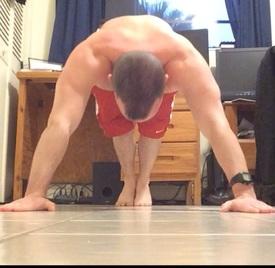Obese once... obese forever?

edwardkim85
Posts: 438 Member
If you were obese once and lost weight through constantly being on a calorie deficit, when you 'maintain', is your TDEE (?)
lower than other people of the same weight?
As in, if I lose weight to 200 lbs by being on a calorie deficit for one year, and I find out that my 'maintenance' required to maintain my weight at 200lbs is 1800kcal, then would I have to eat 1800kcal the rest of my life?
1800kcal is obviously way below what a 'normal' 200 pound male should consume to maintain their weight.
Once I start eating 2500-2800 kcal again, I would gain weight... how to counter this?
lower than other people of the same weight?
As in, if I lose weight to 200 lbs by being on a calorie deficit for one year, and I find out that my 'maintenance' required to maintain my weight at 200lbs is 1800kcal, then would I have to eat 1800kcal the rest of my life?
1800kcal is obviously way below what a 'normal' 200 pound male should consume to maintain their weight.
Once I start eating 2500-2800 kcal again, I would gain weight... how to counter this?
0
Replies
-
Exercise with a balance of strength training and cardio. Muscle burns calories (and fat) while you sleep.0
-
just exercise til you die and don't hit the drive thrus everyday, and always monitor your weight......whatever your goal is, lose an extra 5lbs so you have a little wiggle room......0
-
There are studies that go in that direction...sad but true. They say a person that has lost weight, needs about 20% less cals to maintain, than a person of similar build, that was never overweight.
If you up your exercise, you can eat more, be fit and stay away from becoming obese again. At least that's my plan ;-)
I restrict to 500cals twice weekly and eat at maintainance the rest of the week. I've been losing very well and plan on keeping the low days, when I reach my goal. That will allow me to not have to restrict the rest of the week. I just don't like restricting daily.0 -
No, provided you lose the weight in a healthy way - and even if you didn't, the effects could be reversed, although it can be a long struggle. You also have control over your own TDEE in some ways. If you make exercise a part of your life you will need to eat more. The more LBM you have, the higher your TDEE also.0
-
just exercise til you die and don't hit the drive thrus everyday, and always monitor your weight......whatever your goal is, lose an extra 5lbs so you have a little wiggle room......
So lets say theTDEE for a normal sedentary 200lb man(6 foot) is 2500 kcal.
By the time I become 200lbs, I have been eating 1700-1800 kcal for months (kcal deficit) but as I reached 200 lbs, weight loss slowed or stopped altogether.
Then my 'maintenance' would be 1800kcal right?
However, if I go 10 lbs below , so 190lbs while decreasing my intake to 1600kcal, then slowly up my calorie intake to 2500 kcal and get back to 200 lbs, would I be able to 'maintain' like any other normal 200 pounders?
Anybody with success maintaining a 'normal' range of TDEE after weight loss?0 -
just exercise til you die and don't hit the drive thrus everyday, and always monitor your weight......whatever your goal is, lose an extra 5lbs so you have a little wiggle room......
So lets say theTDEE for a normal sedentary 200lb man(6 foot) is 2500 kcal.
By the time I become 200lbs, I have been eating 1700-1800 kcal for months (kcal deficit) but as I reached 200 lbs, weight loss slowed or stopped altogether.
Then my 'maintenance' would be 1800kcal right?
However, if I go 10 lbs below , so 190lbs while decreasing my intake to 1600kcal, then slowly up my calorie intake to 2500 kcal and get back to 200 lbs, would I be able to 'maintain' like any other normal 200 pounders?
Anybody with success maintaining a 'normal' range of TDEE after weight loss?
No. The closer you get to goal, the closer to maintenance you should be. That's why people here recommend that you up your goal to only a 10% deficit when you are within 10lb.
Thing is, it's hard to determine a 'normal' TDEE. A 200lb man with a high LBM, that has an active job and strength trains 3 times a week would have a very different TDEE to a 200lb man that sits on the sofa watching TV all day.0 -
try reverse dieting. once you have stabilized your weight add in a 50-100 calories every 2 weeks and see if you gain. Dr. Layne Norton you tube biolayne has some interesting vids on reverse dieting and metabolic adaptation. You can work your way back up. I am currently losing weight on more calories. I am trying to gain some weight after 2 years of weight loss. i am eating at 2000 right now. not gaining anything yet. i was eating at 16800
-
Thing is, it's hard to determine a 'normal' TDEE. A 200lb man with a high LBM, that has an active job and strength trains 3 times a week would have a very different TDEE to a 200lb man that sits on the sofa watching TV all day.
yep!0 -
you are overcomplicating it.
if your maintenance is 2500 and you lose at 2000 a day then when you go to maintenance you can just slowly increase back to 2500 or a number below that…so you could go to 2100; then 2200, etc…weight yourself once a week and once you start to gain a little just back the calories off…simple.0 -
you are overcomplicating it.
if your maintenance is 2500 and you lose at 2000 a day then when you go to maintenance you can just slowly increase back to 2500 or a number below that…so you could go to 2100; then 2200, etc…weight yourself once a week and once you start to gain a little just back the calories off…simple.
This.0 -
you are overcomplicating it.
if your maintenance is 2500 and you lose at 2000 a day then when you go to maintenance you can just slowly increase back to 2500 or a number below that…so you could go to 2100; then 2200, etc…weight yourself once a week and once you start to gain a little just back the calories off…simple.
This.
I agree. You were losing. Slowly increase until you're at equilibrium. That number will change as you use more or fewer calories for the rest of your life. Just like it does everyone else in the whole world.0 -
You may have to eat less than an average male at that weight at maintenance but I doubt it will be a 700 calorie difference. 1650 - 1700 is around my estimated maintenance calories right now as a lightly active 5'3 136lb female. I highly doubt 1800 calories will be your maintenance number, and I'm not sure where that number came from for you. You will have to do some trial and error for an exact number but that seems very very low to me. Maybe others with similar stats as yours can confirm this.
On the bright side if you become more active you can increase those maintenance calories!0 -
Yup, this is what I've read as well though I can't vouch for the 20pct figure. I plan to compensate by building a **** ton of muscle mass... I have also accepted that this is a lifestylechange and that I will always exercise. And that's a good thing. I'm nowhere close to being there yet, but I think the key to sustaining this lifestyle will beto periodically find new, challenging and fun goal goals as needed, e.g., a new race to train for, a new lifting routine, a new fitness challenge like 100pushups, etc. At least that's how I envision it.There are studies that go in that direction...sad but true. They say a person that has lost weight, needs about 20% less cals to maintain, than a person of similar build, that was never overweight.0 -
Just make sure that when you start eating maintenance, you move up to it slowly over the course of a few weeks. This is because your RMR drops/adjusts over time to meet the lower calorie intake. Jumping back up will cause more fat loss in the short term, since your RMR needs time to adjust upward.
This is more important for crash dieters, naturally, but it's good to keep in mind regardless.
Basically over time your TDEE drops due to lower calorie intake (how much depends on whether you're eating a 1-2 lb defecit, or if you're eating even less). Need to adjust up slowly so you don't spike calorie intake while you burn is temporarily lowered.0 -
Do you want to know if you have to eat the same amount of cals forever ever?
As you age, you will lose muscle mass naturally. So you would have to eat less cals as you get older...unless of course, you are still strength training too or increasing the amount of calories you are burning...I would think.
Someone else said you are over complicating it. I agree that you are definitely over-thinking it. Try using the TDEE/BMR calcs and change the age section. Maybe that will answer your question.0 -
There does appear to be clinical evidence for "adaptive thermogenesis": see the studies abstracted in this Pubmed search, especially nos. 1, 5, and 7:
http://www.ncbi.nlm.nih.gov/pubmed/?term=weight+loss+weight+maintenance+and+adaptive+thermogenesis
It's not great news, but I'd rather be a healthy weight and eat less than be obese!0 -
If you maintain a healthy lifestyle which includes lifting weight, cardio and counting calories(Getting in you Macro and Micro- nutrients). You will likely not become obese again.0
-
I'm hearing you say that *your experience* is that you need to eat 1800 calories at your current activity level to maintain and that if you increase to 2500, you gain weight.
I don't know if being obese has anything to do with that . It could be that you BECAME obese because you naturally have a slow metabolism.
That being said, I'd try adding 100 calories every 4 weeks or so and see what happens. I seem to have a 500 calorie range where I'll maintain. You might be able to get away with a 2000 calorie or so diet at maintenance.0 -
There are studies that go in that direction...sad but true. They say a person that has lost weight, needs about 20% less cals to
maintain, than a person of similar build, that was never overweight.
The only studies I have seen that show this did not normalize for lean body mass and physical activity and for pre-weight-gain metabolism and for aging effects. Which means they really didn't show this at all - too many other possible confounding factors.
To the OP - 200 pounds is well above average size for males, so the details matter very much. Depending on body composition, your BMR at 200 pounds could be anything from 1500ish to 2100ish. A sub-2k maintenance level would not be out of the question, nor would it require some sort of "metabolic slowdown" to explain.0 -
No, it's generally higher than other people in my age range and that's because I work out five days a week, with intensity. The food is fuel.
It also feels like you're eating more if you choose higher fiber, higher volume, high nutrient, less processed lower fat / calorie foods.
It's a strange irony that I eat almost as much as I did when obese and manage at a proper weight range. When I was obese 1600 calories = maintenance. Now 1900 - 2100 calories is maintenance.
I can't pig out on junk, obviously, but my body has been more than reasonable.0
This discussion has been closed.
Categories
- All Categories
- 1.4M Health, Wellness and Goals
- 398.1K Introduce Yourself
- 44.7K Getting Started
- 261K Health and Weight Loss
- 176.4K Food and Nutrition
- 47.7K Recipes
- 233K Fitness and Exercise
- 462 Sleep, Mindfulness and Overall Wellness
- 6.5K Goal: Maintaining Weight
- 8.7K Goal: Gaining Weight and Body Building
- 153.5K Motivation and Support
- 8.4K Challenges
- 1.4K Debate Club
- 96.5K Chit-Chat
- 2.6K Fun and Games
- 4.8K MyFitnessPal Information
- 12 News and Announcements
- 21 MyFitnessPal Academy
- 1.5K Feature Suggestions and Ideas
- 3.2K MyFitnessPal Tech Support Questions














